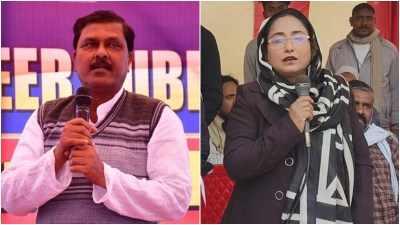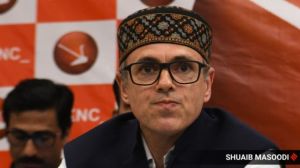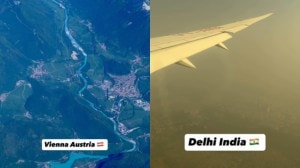Landing in Pak, PM sheds baggage of past, has one thing to declare: hope
Seeking to put the bitterness and hostility of the past behind him, Prime Minister Atal Behari Vajpayee arrived in Islamabad this afternoon ...

Seeking to put the bitterness and hostility of the past behind him, Prime Minister Atal Behari Vajpayee arrived in Islamabad this afternoon with the promise of not only meeting ‘‘his hosts,’’ such as President Pervez Musharraf and Pakistan PM Mir Zafarullah Jamali, but also beginning a dialogue on contentious issues, including Kashmir.
Standing next to Jamali at Rawalpindi airport as the national anthems of India and Pakistan played one after another, the gravity of the moment seemed to banish the bickering and the media-blown controversies of the last few days.
After all, the last time the PM had come to Pakistan, visiting Lahore in February 1999, the Pak Army led by General Musharraf had at the exact same time been preparing for war at Kargil.
Today, though, had begun with an interview with the government-owned Pakistan TV in New Delhi, in which the Prime Minister placed the peace bar so high that it seemed difficult even for seasoned bureaucrats to now order a seasonal cold shower on the gathering bilateral warmth.
Over the space of the 20-minute interview which was broadcast this evening on the eve of the SAARC summit, Vajpayee was his inimitable self, gently overturning the rigidly held positions of his own government on Pakistan and charting out a brave new blueprint for the future.
‘‘Musharraf sahab ke saath baatcheet ho sakti hai,’’ (A meeting with President Musharraf is possible) Vajpayee said almost at the beginning, pointing out, however, that it was difficult to anticipate the outcome of the conversation.In the past, he added, the reason most talks had failed was because both nations talked across each other. India would put forward its point of view and Pakistan its own.
After the interview, the PM took forward his own position by issuing a formal departure statement in Delhi in which he stated that in Islamabad, he would ‘‘take the opportunity of bilateral meetings with other SAARC leaders, besides interacting with our hosts.’’
Indian officials later sought to draw a distinction between ‘‘bilateral meetings’’ and ‘‘interactions,’’ but it was clear that the PM had already spoken. Whatever the nature, time, place and scope of his conversations with his Pakistani ‘‘hosts,’’ Vajpayee seemed clear that he was not interested in the minutiae of diplomatic jargon.
Musharraf, said the Pakistan TV interviewer, had often described the PM as a man of peace, how would he describe the Pakistani President? Sidestepping the opportunity to castigate the author of Kargil, Vajpayee preferred to give the General his due. ‘‘Sabse bade leader hain Pakistan ke. We hope that in future too he will participate in improving bilateral relations. We hope that these attempts will be successful.’’
Asked whether he was willing to fill in the missing links between the Indian and Pakistani points of view on the Kashmir conflict, Vajpayee pointed out that he had ‘‘never hesitated to talk about Kashmir.’’ ‘‘Lagaatar baat ho sakti hai (Talks can continue uninterruptedly).’’
Kashmir, the PM pointed out, was a part of India. But he also felt that on this issue, the two sides had never aired their view. ‘‘Is (Kashmir) ke savaal par jam ke baat nahin hui…Both our nations need time to resolve this,’’ he said. Asked about the riots in Gujarat in which many Muslims were killed, which was taken by many people in Pakistan as a validation of their own notions, the PM was asked whether Gujarat would be an issue in the forthcoming Lok Sabha elections.
‘‘What happened in Gujarat,’’ Vajpayee said, ‘‘was bad. Bahut bura hua. But before the Muslim massacres, another terrible incident had occurred. That was a wrong step.’’ He emphasised that Gujarat would not become an election issue. He also spoke about promoting intra-regional trade, a social charter for the region as well as more effective cooperation in tackling the menace of terrorism.
In an interview to DD, Vajpayee said the idea was to focus on strengthening the SAARC process. ‘‘We want to give our undivided attention to the success of SAARC. Its success will help resolution of other problems.’’
On Kashmir, he said patience was key as it was a complex problem. ‘‘What is needed to resolve the issue is patience. That’s because the issue has different aspects. One part of Kashmir is under Pakistani occupation and there is no talk about it. Another portion in the North is no longer a part of J-K and has been given to a third country…. It is a complex problem,’’ he said.



- 01
- 02
- 03
- 04
- 05




























